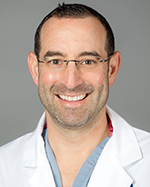Moffitt Receives Accreditations for Five Fellowship Programs
Providing patients with the highest standard of care has always been a priority at Moffitt Cancer Center. To provide such care, Moffitt ensures that their team members are receiving top training. That’s why it comes as no surprise that Moffitt was recently awarded five accreditations for selective pathology programs from the Accreditation Council for Graduate Medical Education (ACGME).
The ACGME is a nonprofit organization that serves to evaluate, improve and publicly recognize graduate medical education programs and sponsoring institutions that are in substantial compliance with the standards of educational quality established by the organization. Accreditation is achieved by a voluntary process of evaluation and review.

Dr. Jonathan Zager, chief academic officer and surgical oncologist in Moffitt’s cutaneous oncology program.
“Our institutional accreditation allows Moffitt to be one of the only free-standing cancer centers in the country to sponsor and oversee the education and training of physicians in these specialized training programs,” said Dr. Jonathan Zager, chief academic officer and surgical oncologist in Moffitt’s cutaneous oncology program.
Although this is the cancer center’s first time receiving an ACGME accreditation, Moffitt is no stranger to the ACGME process. The cancer center has served as the primary academic and clinical training site for ACGME accredited oncology residency and fellowship programs at the University of South Florida (USF) since 2008.
“We’ve proven the quality of our medical education to the ACGME during many accreditation site visits to the USF programs throughout the years,” said Zager.
Deciding it was time for the cancer center to have its own accreditation, Moffitt’s clinical education team started the process in 2015 by organizing their staff and the documentation needed to apply.
From there, they focused on the Pathology department and the five exceptional Pathology subspecialties that are accredited under the ACGME’s Selective Pathology standards.
“We worked gradually to establish the breadth and depth of documentation required by the ACGME. During two weeks in the fall, multiple members of the Pathology department and the graduate medical education team focused on getting the final applications pulled together, polished and submitted,” Zager said.
In 2018, Moffitt earned Institutional Accreditation from the ACGME, and then in 2020, it received program accreditation of five fellowship programs.
Zager says this endorsement shows that Moffitt is training pathologists to be well-educated and equipped to provide patient care now and after they graduate from their fellowship programs.
The accredited programs are subject to continual oversight by the ACGME to ensure that the high standards are maintained. Moffitt must continue to excel in patient care, education, research and provide a productive and positive learning environment for doctors in training to maintain the accreditation.



